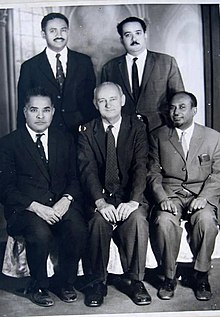Mohamed Hamad Satti
Mohamed Hamad Satti | |
|---|---|
محمد حمد ساتي | |
| Scientific career | |
| Fields | |
| Institutions | University of Khartoum World Health Organization |
Sovereignty Council (1964–1965) Ismail al-Azhari | |
| Preceded by | Mansour Ali Haseeb |
| Succeeded by | Mahmoud Abdel Rahman Ziada |
Mohamed Hamad Satti (
Life and career
Early life and education
Mohamed Hamad Satti was born in

Satti then started his medical training working as a medical officer in areas endemic to
Career
Satti was elected a member of the
Satti occupied several posts in the Sudanese Ministry of Health. He was an educator at the Faculty of Medicine, University of Khartoum (1946–1948, 1963–1969) and a researcher of bacteriology, medical zoology, epidemiology, forensic medicine, and pathology.[4] He laid the foundation of several laboratories and tropical medicine research centres in Sudan which include the National Health Laboratories, the Cancer Institute for Tropical Diseases Research, the Medical Research Council (1966), the School of Tropical Medicine (1966), the National Council for Research (1970), and the Institute of Medical Laboratory Technology.[5][6][2] He was the director of the Institute of Tropical Medicine Research at the Medical Research Council, Sudan.[2]
Satti did not have a private clinic throughout his career. He was known for being an entertaining educator who linked scientific information with stories from his fieldwork. Satti had a very philanthropic approach to medicine as he once repurposed his private car as an ambulance.[2][1]
Once he retired in 1969, he became an advisor to the Sudanese Medical Research Association.[7] He worked with WHO as a consultant epidemiologist and public health advisor to study the environmental effects of Lake Nasser in 1970.[8] He was the Vice Chairman of the WHO Onchocerciasis Expert Committee in 1986.[9]
Personal life and death

Satti was married to Fatma Hassan el Nor and with her, they had thirteen children. He died from natural causes on 15 March 2005, and was buried in Faroug Cemetery, Khartoum.[10]
Research

Satti carried out extensive field and laboratory work on
He presented his research at the first Italian Conference of Tropical Medicine in East Africa, Asmara,[15] in 1952, and the International Congress of Tropical Medicine and Malaria (1958–1986).[16] He left a legacy of scientific excellence that earned him the name The father of Medical research in Sudan.[1][17]
Awards and honours
Satti received an
See also
- El-Hadi Ahmed El-Sheikh
- El-Sheikh Mahgoub Gaafar
- Mohamed El-Amin Ahmed El-Tom
References
- ^ ISBN 978-1-0964-3574-7. Archivedfrom the original on 2022-12-05. Retrieved 2022-12-04.
- ^ a b c d e f "محمد حمد ساتي (شيخ العلماء السودانيين)" [Mohamed Hamad Satti (1913-2005), The Father of Medical Research in Sudan, His life and work: Milestones in Field Research in Tropical Disease Pathology, Bacteriology and Epidemiology]. محمد حمد ساتي (شيخ العلماء السودانيين). Archived from the original on 2022-11-28. Retrieved 2022-11-28.
- ISBN 978-1-108-84469-7. Archivedfrom the original on 2023-03-25. Retrieved 2022-12-04.
- ^ from the original on 2022-11-28. Retrieved 2022-11-28.
- ^ lil-Burhūth, Sudan Majlis al-Qawmī (1973). Science Policy and Annual Report For... of the National Council for Research. National Council for Research. Archived from the original on 2023-03-25. Retrieved 2022-12-04.
- ^ a b Haseeb, Mansour Ali (1973). Monograph on Biomedical Research in the Sudan. Archived from the original on 2023-03-25. Retrieved 2022-12-04.
- ^ WHO Chronicle. World Health Organization. 1985. Archived from the original on 2023-03-25. Retrieved 2022-12-04.
- ^ a b Squires, Herbert Chavasse (1958). The Sudan Medical Service: An Experiment in Social Medicine. Heinemann Medical Books. Archived from the original on 2023-03-25. Retrieved 2022-12-04.
- ^ The Annals of Otology, Rhinology & Laryngology. Annals Publishing Company. 1962. Archived from the original on 2023-03-25. Retrieved 2022-12-04.
- ^ a b c Safi, Ahmed El (2019). Mohamed Hamad Satti: The Father of Medical Research in Sudan : His Life and Work (1913-2005) : Milestones in Field Research in Tropical Disease Pathology, Bacteriology and Epidemiology. Sudan Medical Heritage Foundation. Archived from the original on 2023-03-14. Retrieved 2022-12-04.
- ISBN 978-1-0951-8247-5. Archivedfrom the original on 2023-01-30. Retrieved 2022-11-28.
- ISBN 978-0-7486-0261-2. Archivedfrom the original on 2023-03-25. Retrieved 2022-11-28.
- PMC 4949813.
- ^ شيخ العلماء الدكتور محمد حمد ساتي: نذر العلم في خدمة بحوث الطب [Sheikh of Scientists, Dr. Muhammad Hamad Sati: A vow of science in the service of medical research] (in Arabic). Dār Madārik lil-Nashr. 2013. Archived from the original on 2023-03-25. Retrieved 2022-12-04.
- ^ Kenya, Library of Congress Library of Congress Office, Nairobi (1981). Accessions List, Eastern Africa. Library of Congress Office.
{{cite book}}: CS1 maint: multiple names: authors list (link) - ISBN 978-0-7637-2879-3. Archivedfrom the original on 2023-03-25. Retrieved 2022-12-04.
- ^ Hughes, Charles Campbell (1969). Diseases and "development" in Africa. Michigan State University. Archived from the original on 2023-03-25. Retrieved 2022-12-04.
- ^ "Public health prizes and awards". World Health Organization. Archived from the original on 2023-02-19. Retrieved 2022-11-20.
- ^ "Dr Satti Foundation". Archived from the original on 2022-11-28. Retrieved 2022-11-28 – via YouTube.
- ^ "Dr.Satti Foundation". Archived from the original on 2022-11-28. Retrieved 2022-11-28 – via Facebook.
